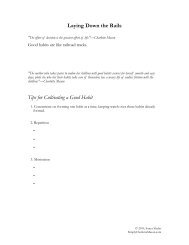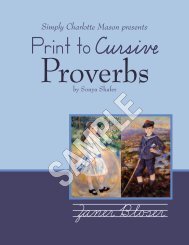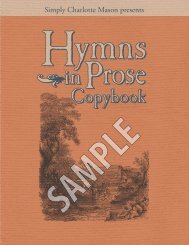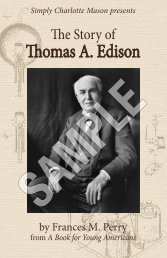Laying Down the Rails for Children - Simply Charlotte Mason
Laying Down the Rails for Children - Simply Charlotte Mason
Laying Down the Rails for Children - Simply Charlotte Mason
You also want an ePaper? Increase the reach of your titles
YUMPU automatically turns print PDFs into web optimized ePapers that Google loves.
Decency and Propriety Habits<br />
cutting boards and utensils. Washing hands be<strong>for</strong>e cooking, pulling long hair back into<br />
a ponytail, using a separate surface <strong>for</strong> meat preparation, washing fruits and vegetables,<br />
cleaning up <strong>the</strong> kitchen when finished—all of <strong>the</strong>se are good topics <strong>for</strong> discussion.<br />
“Certainly this is a duty, not a sin. ‘Cleanliness is indeed next to godliness.’ ” — John<br />
Wesley<br />
Lesson 9<br />
Discuss how Cleanliness is a service to o<strong>the</strong>rs. Reminisce about a time when you’ve been<br />
in a clean hotel room or a clean home and how welcoming it felt. Presenting ourselves<br />
with clean teeth, combed hair, and neat clothing is appreciated by o<strong>the</strong>rs. A person<br />
doesn’t have to be obsessive about cleanliness; but just <strong>the</strong> right amount of ef<strong>for</strong>t makes<br />
life pleasant <strong>for</strong> those around us.<br />
Read “The Sanitary Commission” and discuss how important cleanliness was in that<br />
account. Define “sanitary” or “sanitation” as needed.<br />
Notes<br />
If a particular lesson<br />
doesn’t seem like it would<br />
be a good fit <strong>for</strong> your<br />
children, skip it. Your<br />
children will still benefit<br />
from <strong>the</strong> lessons you do<br />
use. Make <strong>the</strong>se lessons<br />
your servant, not your<br />
master.<br />
The Sanitary Commission<br />
from An American Book of Golden Deeds by James Baldwin<br />
On <strong>the</strong> 13th of April, 1861, Fort Sumter in Charleston harbor was fired upon by<br />
<strong>the</strong> soldiers of <strong>the</strong> South.<br />
This was <strong>the</strong> beginning of <strong>the</strong> great struggle known in history as <strong>the</strong> Civil War in<br />
America.<br />
Two days be<strong>for</strong>e this, Abraham Lincoln called <strong>for</strong> seventy-five thousand men to<br />
defend <strong>the</strong> government and maintain its laws in <strong>the</strong> South.<br />
The call was answered at once and with great enthusiasm. Not only did seventyfive<br />
thousand men offer <strong>the</strong>mselves, but thousands more who could not be accepted.<br />
Business was at a standstill. The plow was left in <strong>the</strong> furrow. The factory doors were<br />
closed. The thoughts of all men were upon <strong>the</strong> crisis which <strong>the</strong> country was facing. In<br />
every village of <strong>the</strong> North <strong>the</strong> tap of <strong>the</strong> drum and <strong>the</strong> shrill music of <strong>the</strong> fife were heard.<br />
On <strong>the</strong> very day that Lincoln issued his call, some women of Bridgeport, Connecticut,<br />
met toge<strong>the</strong>r to consider what <strong>the</strong>y could do.<br />
“We cannot go to war,” <strong>the</strong>y said, “but our husbands and sons can go—yes, <strong>the</strong>y<br />
will go. Shall we who remain at home be idle?”<br />
“There will be bloodshed,” said some.<br />
“And <strong>the</strong>re will be much suffering in camp and on <strong>the</strong> march,” said o<strong>the</strong>rs. “Men<br />
will be wounded in battle, <strong>the</strong>y will be sick from exposure, <strong>the</strong>y will need better attention<br />
than <strong>the</strong> army surgeons alone can give <strong>the</strong>m. Can we not do something to help?”<br />
And so <strong>the</strong>se earnest, sympa<strong>the</strong>tic women of Bridgeport organized <strong>the</strong>mselves into<br />
what <strong>the</strong>y called a Soldiers’ Aid Society, and resolved to do all that <strong>the</strong>y could <strong>for</strong> <strong>the</strong><br />
relief and com<strong>for</strong>t of <strong>the</strong> men who were at that moment hurrying <strong>for</strong>ward to answer <strong>the</strong><br />
President’s call.<br />
“We cannot fight,” <strong>the</strong>y said, “but we can help <strong>the</strong> fighters.”<br />
Miss Almena Bates, a young lady of Charlestown, Massachusetts, did not know what<br />
<strong>the</strong> ladies of Bridgeport were doing, but she started out that same day to do something<br />
herself. She went with pencil and paper to her friends and acquaintances, and asked each<br />
one to volunteer as a helper.<br />
“The boys are answering <strong>the</strong> President’s call,” she said. “To-morrow <strong>the</strong>y will be on<br />
<strong>Simply</strong><strong>Charlotte</strong><strong>Mason</strong>.com 21
















